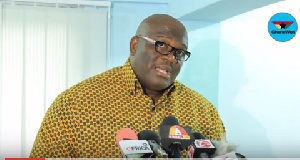 Deputy Minister of the Interior, Henry Quartey
Deputy Minister of the Interior, Henry Quartey
Religious Leaders and Financial Institutions have been called upon to collaborate in the fight against Money Laundering (ML) and Terrorism Financing (TF), using their respective platforms to educate their followers and clients.
It is acknowledged that money laundering, like the tentacles of an octopus, has permeated the social, political as well as the economic fabric of many countries, including Ghana, leaving calamitous trails in its wake.
As part of the efforts to address the challenge, the Inter-Governmental Action Group against Money Laundering in West Africa (GIABA), which is a specialised Institution of ECOWAS, has opened a two-day National Sensitisation seminar on Anti-Money Laundering (AML) and Combating Financing of Terrorism (CFT) in Accra.
The Seminar is targeted at religious leaders and financial institutions across the West Africa Sub-region, with the objective of raising the awareness level of these key groups on their role in the fight against AML and CTF.
Mr Henry Quartey, the Deputy Minister of the Interior, at the opening of the seminar on Wednesday, said these crimes had assumed transnational dimensions and become a global phenomenon, resulting in sophisticated multinational organised crime, where syndicates perpetuated their nefarious activities either through drug and human trafficking, or terrorism and money laundering.
He, however, attributed the surge in acts of terrorism and other organised crimes within the Sub-Region to the availability of funds to these unscrupulous people, which was mostly laundered money.
Mr Quartey said “indeed no country can single-handedly fight these syndicates and eliminate or reduce the grave effects of their actions on countries’ economies and sometimes leading to the loss of lives”.
He, therefore, commended the leadership of ECOWAS and particularly GIABA for organising the seminar, saying while state institutions did their part to curb the canker, it behoved on eminent and noble personalities in society to come on board and play their part in the fight.
He noted that building synergies and strengthening of capacities in this regard formed important and integral part in the fight, and implored the participants to take advantage of the wealth of knowledge to be acquired from the seminar to aid them in shaping society against AML and CTF.
Mr Kwaku Dua, the Chief Executive Officer of the Financial Intelligence Centre (FIC) and GIABA National Correspondent for Ghana, stressed on strengthened networking and knowledge capacity of civil society groups in dealing with these organised crimes that were assuming an alarming dimensions in countries including Niger, Mali and Burkina Faso, in order to curb it.
Dr Buno Nduka, the Director of Programmes and Project, GIABA, said key objectives of the programme included building strong partnership with Faith-Based Organisations in AML/CFT, promoting their understanding of GIABA’s mandate, and agreeing on actionable points to curb violent extremism to promote peaceful co-existence in the society.
He said the fight against AML and CTF was a collaborative responsibility of all stakeholders towards protecting the economies and financial systems from the laundering of proceeds of crime, hence GIABA recognised the valuable contribution of religious leaders as guardians of faith and the tremendous way their institutions held among their followers.
He explained that one of GIABA’s fundamental goals was therefore to promote strategic partnerships with the private sector, civil society and other key stakeholders to increase awareness of AML/CTF in order to empower citizens to take action.
Dr Nduka said recognising the role of religious leaders in Preventing Violent Extremism and promoting the religious dimension of intercultural dialogue, they would be tasked to provide guidance to their “vulnerable followers to reject violent ideologies”, and promote “tolerance, understanding and reconciliation between communities”.
Some of the topics to be treated during the seminar include: The role of Religious Leaders in Preventing Money Laundering and Terrorism Financing; Money Laundering and Terrorism Financing Risk and Vulnerabilities Associated with Religious Organisations; Religious Institutions as a Tool for Promotion of Peaceful Co-Existence; Risk of Terrorist Abuse in Non-Profit Organisations; and Promoting Tolerance and Preventing Violent Extremism.
Participants were from Faith-Based institutions including the Catholic, Methodist and Anglican Church, the Ghana Pentecostal and Charismatic Council, the Office of the National Chief Imam, the Ahmadiyya Muslim Mission and the Alhasuna as well as traditional.
Presentation would be delivered by technical experts from both the GIABA faculty and institutions such as the National Peace Council, Bank of Ghana, Ministry of Justice and Attorney General, Ministry of Finance as well Gander, Children and Social protection.